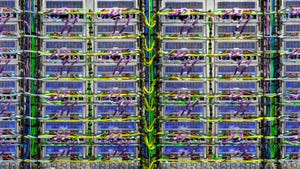Intel Unveils Advance in Low-Power Chips
Intel has developed a new 45 nanometer processor that represents as significant advance in low-power computing.
January 27, 2007
Intel has developed a new 45 nanometer processor that represents as significant advance in low-power computing, and IBM is not far behind. The New York Times writes that the new chips have "overhauled the basic building block of the information age, paving the way for a new generation of faster and more energy-efficient processors." An excerpt:
The new approach to insulation appears at least temporarily to conquer one of the most significant obstacles confronting the semiconductor industry: the tendency of tiny switches to leak electricity as they are reduced in size. The leakage makes chips run hotter and consume more power.
Intel co-founder Gordon Moore called the advance "the biggest change in transistor technology since ... the late 1960s." Intel said the new chips will have "five times less leakage power than those made today. This will improve battery life for mobile devices and increase opportunities for building smaller, more powerful platforms."
This could explain the announcement earlier this week that Intel has won back Google's business from AMD, apparently by creating custom motherboards to fit Google's demanding data center specs. Google is notorious for its focus on power efficiency in the data center, so that shift makes more sense if it involves the new Intel chips.
Intel has additional details on its web site, including a video interview with Mark Bohr, who led the team that developed the chip.
IBM expects its 45n technique to debut next year in chips made by its partners, which include AMD and Japan's Toshiba Corp. That appears to give Intel an extended window in which it can claim leadership in low-power computing, an area where AMD's efforts had helped it gain business from Intel in recent years. In November Intel acknowledged that it had been slow to recognize the importance of power efficiency, but promised that its latest designs "have clearly comprehended the fundamental marketplace shift requiring lower power consumption with high performance." Today they began delivering on that promise.
About the Author
You May Also Like

.jpg?width=300&auto=webp&quality=80&disable=upscale)





